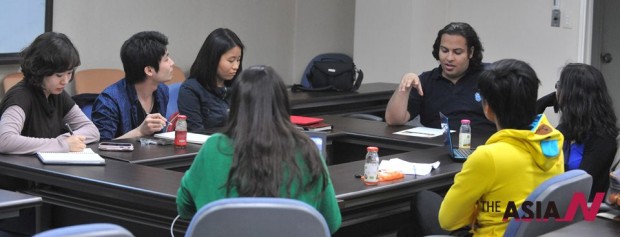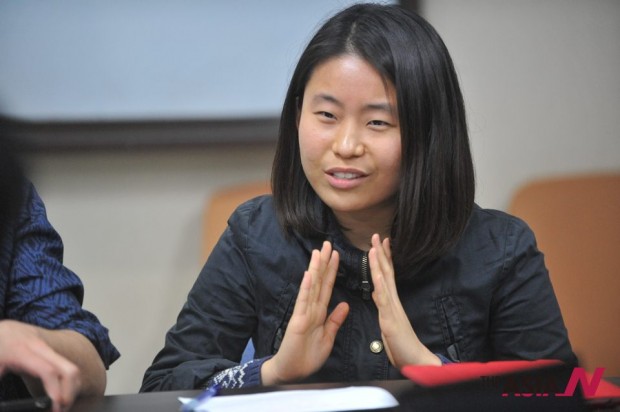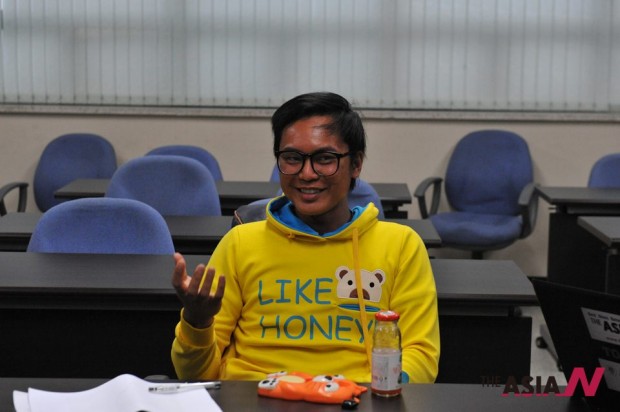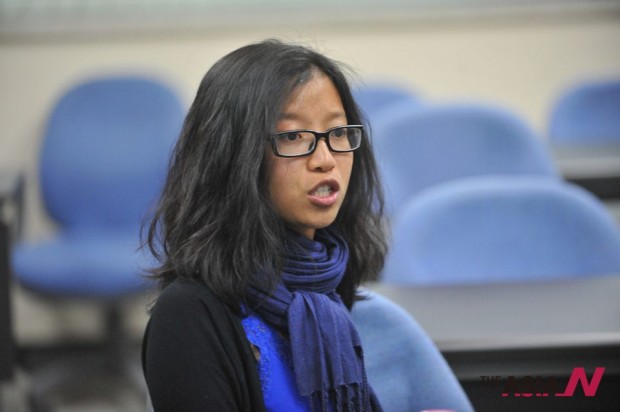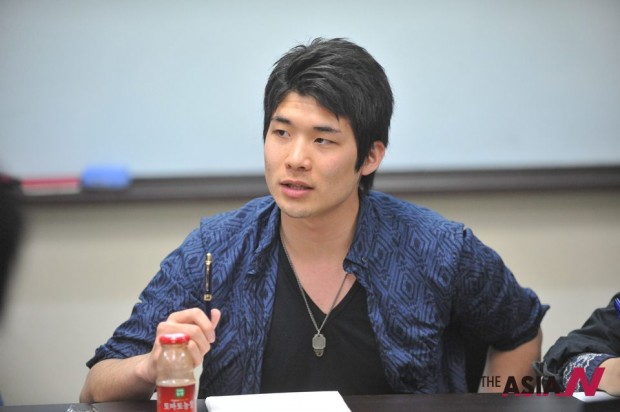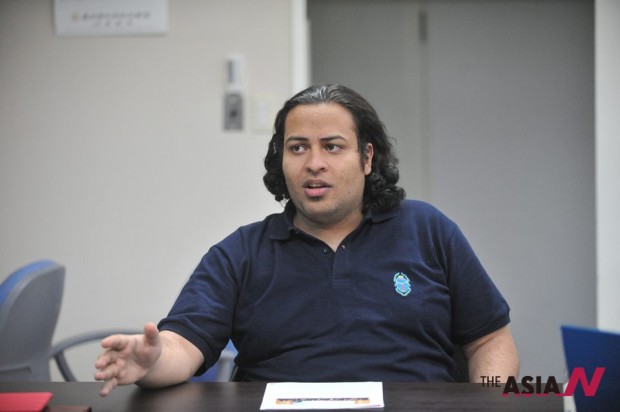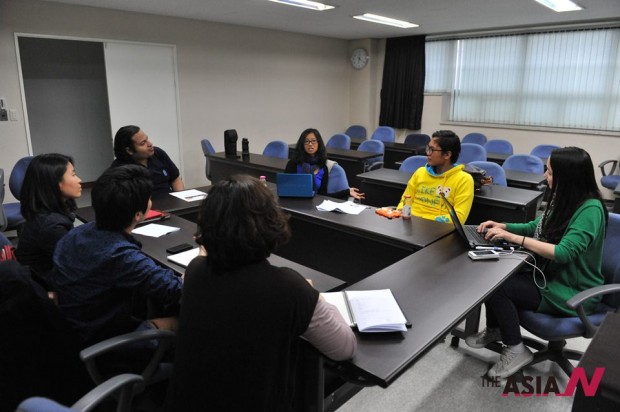[Junior AJA Talk] What would you do for Asia if you were UN Sec-Gen?
The Asia Journalist Association(AJA) has created the Junior AJA program to allow for international students to experience journalism and expand their perspective of their country, Asia and the world through workshops, writing articles, networking and exchanges. 18 international students from 16 different countries are participating in the program from April to August 2013. Among the program activities was the Junior AJA talk, where 4 to 5 students come together and discuss various topics. The first Junior AJA Talk was held on April 19 at the AJA office in Seoul, Korea under the topic, “What would you do for Asia if you were UN Secretary-General Ban Ki-moon?”
Participants: Mohamed Hussein(Egypt, Hankuk University of Foreign Studies), Lara Chung Deboek(Belgium, Seoul National University), Chan Lan Hong(Malaysia, Hankuk University of Foreign Studies), Brillarch Dayag(Philippines, Far East University), Takahiro Takahasi(Japan, Sun Moon University)
Q1: “What would you do for Asia if you were UN Secretary-General Ban Ki-moon?”
Mohamed: I would remove the veto power of the 5 countries in the Security Council. The Security Council was made to protect the world and keep the world secure. But, the problem is that the countries with veto power can stop any decision they do not like and this could be against the world. For example, China and Russia’s veto is stopping the making of decisions concerning the Syrian conflict. With the veto power in existence, our world is not secure.
Lara: Asia has so many issues such as poverty, human trafficking, illiteracy, etc., but I think the formation of desert is a big problem. It is in China, India, and Pakistan. And this problem will lead to bigger problems economically and also cause more poverty because if there is more desert, then there will be less arable land for agriculture leading to shortage of food supply.
The United Nations should be more sensible about global warming and find other ways to solve this issue, which would probably be investing in renewable energy. They are doing this already, but the speed is not fast enough. My opinion is to make a change before it is too late. I think they are already trying very hard to develop renewable energy, but since natural resources will always be very important, it is an obstacle causing war.
Also in Korea, there is a lot of garbage and excessive use of plastic. The government needs to make more measures to make the people more aware about environmental issues and being environmentally friendly. Korea has a good recycling system. The problem is that too much is used.
Takahiro: In Japan, the society is addressing environmental issues and recycling. However, even though Japan is a developed nation and part of G7, it is a very capitalist society focusing on profit. Profit is first and then the environment. After the 2008 Lehman Brothers crisis, Japan started to become a little more skeptical about capitalism and started to think more about how to give back to society as they make profit. Japan is now more focused on having beneficial win-win relations with other nations in the Asia Pacific region. I think the strengthening of relations between the countries can help to solve the environmental problems.
Chan Lan: The first issue I would like to address is education for the whole of Asia because many people from low income households are not able to get an education since they cannot pay for the expensive school tuition fees. I disagree with the whole education system itself because we are made to believe that our lives depend on the grades that we get. The education system should change. Instead of just giving us exams, why don’t they test us on something that we are good at? Education is too focused on memorization opposed to the development of creativity. Education should not test students on how well they can memorize, but how well they know the subject. I think we should learn how to connect ideas together. The education system should help and develop students’ creativity and not mold them to have the exact same thoughts and opinions. This issue is everywhere, but it might be a bit more rigid in Asia, where Confucius thoughts make students to obey what the teacher says.
The mindset that we should choose professions that have a bright future and can make a lot of money instead of choosing to major and educate ourselves in an area that we like is also a problem as many people are then pushed into fields that they do not like and are not even good at. It’s like asking a fish to climb up a tree.
The government is taking so much of our tax money. So, why are they charging so much for tuition? I think people should get free education. Leaders are always saying that the youngsters of today are the leaders of the future. So why not help them (to get an education)? Some geniuses cannot afford to go to school. A boy may be the boy to find the solution to cancer, but cannot because he cannot get an education due to his family’s low income. Education should be free.
Also in poor areas with a lack of schools and teachers, maybe we can make NGOs and gather volunteers with a passion to teach. We can start small with volunteers and if progress is made, we can start building schools.
Lara: It’s very interesting because I come from Belgium and students are quite free to choose what they want to study. But, in this case you end up with jobs that nobody can fill. Many people end up studying arts and humanities and there is nobody majoring in certain fields. In Asia, people seem to study fields that the market needs and for jobs that are in demand. I am skeptical if it is really a positive phenomenon to let people choose what they want to study freely. There needs to be a balance. One needs to be aware of what jobs are in demand and what one wants to study. I think it is a problem to only do what you love and then not be able to find a job in this area. This might make people move to other countries to find jobs. I feel that the competition in Asia helps guide people to do things that are more useful afterwards.
In Belgium we pay a good sum of tax: 30%~40%. Therefore we don’t pay too much for tuition. We pay approximately $700~800 a year for college tuition. The only way for free education is by having the richer people pay more taxes so that the people who get paid less can be funded. The money has to come from somewhere. People have to be paid. The state needs a source of money to pay the teachers.
Brillarch: I think poverty is the first issue that needs to be addressed. There are many poor, developing nations in Asia. With regards to free education, I disagree. Educational institutes need to run and continue to develop. That’s the reason that American universities have such high education fees. If I was the ruler of Asia, I would first solve poverty. Environmental problems as well as greed and corruption are causes of poverty. Poverty related corruption is the biggest problem. To solve this, I think there needs to be a standardized law for transparency so people should be aware for how and where money is being spent. According to Ban Ki-moon, poverty was on the top of the Millennium Development Goals, which are supposed to be solved within 2 years. But, when I think about my country (the Philippines) I know it is really, really impossible especially when it comes to solving corruption.
Mohamed: First of all, we need to overcome corruption. KOICA has a policy of only helping through the government, not private organizations. But, many governments are corrupt and ask for bribes. I also think we first need to solve corruption to overcome poverty. Corruption cannot only be overcome by education, but enforcement such as security like CCTV devices. For example, in Egypt, since there are very few CCTV devices, anyone can easily get away with a crime. Strong security has helped to overcome corruption. Also, we need make a system and change the law to deal with legal & illegal corruption.
Lara: I think the system of money is the problem and obstacle to overcoming corruption and poverty. Maybe we should change the monetary system. We are buying the nonexistent future.
Takahiro: In 2006, currency swap occurred in the Asian region: ASEAN and Northeast Asia. But, Japan said it would not continue to swap currency since former president Lee, Myungbak set foot on Dokdo. Constant borrowing and paying back within the Asian nations was good for the economy. Unfortunately, it did not go so well due to political reasons. But, I felt it could work out like the EU and could prevent further wars. I feel we need to start from the economy in order to secure peace. We cannot discuss peace without thinking about the economy. This system helps countries to not only think about the interests of their own country, but of Asia on a whole. When the yen’s value increased greatly and the Korean won fell, if the two countries conducted a currency swap, the value of the yen would decrease, but it would help strengthen the currency of Asia on a whole. If you think solely about Japan, it would not be necessary, but it is important when considering Asia as a whole. Also, this could help prevent conflict and wars in the region too. If one country has a lot of currency in another country, they would think twice before attacking or starting conflict with that nation. There has not been a war in the EU since World War II and after they unified the currency. I think currency swap would encourage countries to think about Asia as a whole when making decisions.
Q2: What are your thoughts about the North Korean Issue?
Mohamed: The Korean issue should be solved by China and the US. Also, North Korea needs educated people to make a proper government. If the Koreas unify, North Koreans can work in factories. Instead of being a burden, they can be helpful to Korea. Also, it is important to educate the North Korean people on a whole. Give them education and they will ask for democracy.
Lara: I think it is too dangerous for the US to remove troops. This will lead to civil war. North Korea wants to start negotiations with the United States, China and the parties involved. I think they are willing to negotiate and I think this is the first step instead of doing some actions that are difficult to predict the outcome.
If we cannot get rid of Kim Jong-un, let us reach the people and start with education. Also I am skeptical about whether young South Koreans are willing to fight for reunification. Maybe the education of South Korean younger people is also an important matter.
Brillarch: I learned that China supports North Korea. In the trading system between North Korea and China, 70% comes from China and 1% from North Korea. North Korea cannot leave China’s sphere otherwise they will die. And I do not know if South Korea will ever be willing to embrace North Korea with all its debt and their political system. I am also worried about the younger generation in South Korea as they do not think very positively about unification and think if the Koreas unify that North Koreans will take all their money. So, maybe East and West Germany’s unification could be one good model for the Korean reunification even though it is a different case. I think there are many factors to consider besides Kim Jong-un. Well, from South Korea the younger generation needs to be addressed and for North Korea, Kim Jong-un himself.
Chan Lan: We should negotiate with China to stop aiding North Korea. We can keep the North Korean regime the same, put Kim Jong-un as a symbol and give him what he wants with the condition that he will leave the people alone. Then, we can have UN countries participate to help grow the economy and make the society more stable.
Takahiro: I have not studied much about North Korea, so I am not so sure, but in 2007, North Korea launched a missile, which landed in the ocean between Japan and South Korea. At that time, there was a politician who brought up the idea of Japan developing nuclear missiles. The US was very against this. The US said suggested having the six-party talks. I feel that the six-party talks were a good opportunity for the six countries to come together, have conversation and become closer. The two Koreas have been divided since the 1950s and it is now difficult for peaceful talks between the two Koreas. The division of the two Koreas is not only an issue for North Korea and South Korea, but also of the world. I think the six-party talks should resume and I hope they are more long term.
Q3: What do you think about an Asian Union?
Mohamed: Well, the European Union took about 50 years to be developed and only in the last 10 years we heard about it. It’s been 13 years since the Euro was implemented. It took a long time to make the Asian Union: something like 50 years or so. We have too many problems in Asia preventing us from making the Asian Union right now. It was possible in Europe because after the Second World War, there was only one power controlling the whole continent, which made it easier to unify the opinion. But, in Asia there is no one power controlling the whole region and in the future this will also be difficult.
It may be possible in 50 years, but which countries will agree to do this? Japan and Korea, the most advanced and developed countries in Asia, are very unlikely to agree due to differences between the two countries. They have not started such a movement until now because they are not interested in this.
In Europe, the boundaries between certain countries have been removed letting people move freely. Can you imagine if the borders between some countries like Korea and Japan are removed? Living in Japan is more expensive than Korea, so all the Japanese will come and live in Korea. This is happening in the EU right now. Italians are migrating to England and then asking the British government for social welfare benefits. The union of Gulf countries is quite a successful case even though they do not use the same currency. 3 or 4 of the Gulf countries have similar exchange rates and since the government’s wealth and economies are similar, it is not a problem to move freely between these countries. They have a foreign investment law making it much easier for Gulf countries to invest in each other’s countries. So, if we have several countries with similar demographics, economies, welfare and culture, we can start building some kind of union. But until we reach this point, it is difficult.
Lara: I think an Asian Union would be convenient. We would not have to change money anymore between each country. Even though it may be difficult, I think we can start with something small and then it can grow. We could also suggest something to Japanese and Korean governments. Maybe some economic experts in the Asian region would be helpful in the matter of the practicality of an Asian Union.
Brillarch: As for the Philippines, I do not know about our government, but with regards to one currency, it would take a lot of time, because right now we are focusing on improving our currency in the world market.
Q4: If we were to write a letter to UN Secretary-General Ban Ki-moon and you could write one sentence, what would it be?
Mohamed: Please remove the veto power.
Brillarch: Please tackle poverty as soon as possible. Some of my friends died because they were not able to afford an education. Also, I want the UN to be more aggressive when it comes to issues concerning war and the environment.
Chan Lan: Please rethink the education system. May we have free education and may education help develop creativity opposed to mere memorization.
Takahiro: I think the UN is too dependent on the US. I am disappointed that the UN is not playing its role to keep peace. I hope the UN reduces its power and plays the role as a pipeline between nations, giving them the chance to talk together.
Lara: I would like more chances for us to receive education about all the problems so we can think about good ideas and better solutions. We could have mandatory basic courses on human rights, environmental problems, poverty issues, etc. Everyone having access to education in these fields would be a big help as we could be aware of the issues and then we could think of good solutions.
Q5: What is your own dream?
Brillarch: After graduation, I would like to study more, especially about business. I would like to do business in the world and become part of a multi-national company that is working with Canada.
Lara: My dream is to find my passion whether it is a job or a country where I want to live. I would like to find a job that can fulfill my passion and also help other people and the society.
Mohamed: I would like to get Korean citizenship because I love Korea. I like the transportation system. I would like to find a good job in Korea and live the rest of my life here.
Chan Lan: I would like to become a great interpreter. I believe that miscommunication leads to so many problems and disputes. So, I would like to be a bridge to bring people together.
Takahiro: I would like to make a world-wide NGO where people of different ideologies and religions can come together and talk, especially in Israel.





















